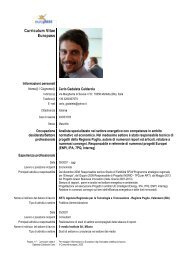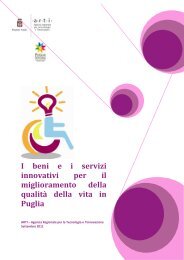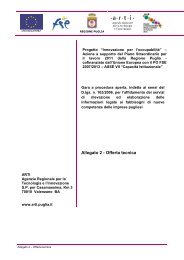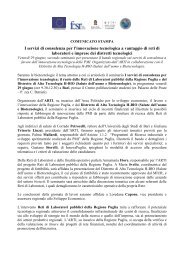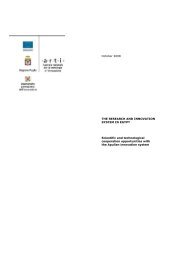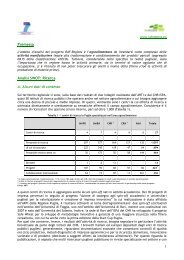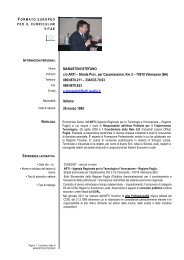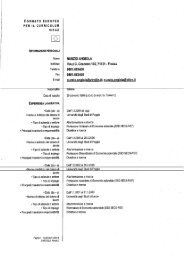the research and innovation system in egypt - ARTI Puglia
the research and innovation system in egypt - ARTI Puglia
the research and innovation system in egypt - ARTI Puglia
Create successful ePaper yourself
Turn your PDF publications into a flip-book with our unique Google optimized e-Paper software.
3. Education <strong>in</strong> Egypt<br />
3.1. Introduction<br />
Current educational philosophy <strong>in</strong> Egypt is <strong>the</strong> product of three cultural heritages: British,<br />
secular (westernized) Egyptian, <strong>and</strong> Islamic (traditional) Egyptian. The British protectorate<br />
<strong>in</strong> Egypt left an exclusionary, state-controlled education <strong>system</strong> structured to serve elite<br />
(British) <strong>in</strong>terests with little concern for <strong>the</strong> masses. The heritage was one of restricted<br />
opportunity, unenforced limited education (generally of poor quality), <strong>and</strong> higher<br />
education reserved mostly for <strong>the</strong> elite. Egyptians <strong>and</strong> non-English foreigners were left few<br />
options but to exp<strong>and</strong> private <strong>and</strong> religious education.<br />
Muhammad Ali, regarded as <strong>the</strong> fa<strong>the</strong>r of modern Egypt <strong>and</strong> its education <strong>system</strong>,<br />
<strong>in</strong>troduced a secular, modern, western educational philosophy complete with sciences.<br />
Egyptian leaders s<strong>in</strong>ce <strong>the</strong> bloodless revolution that ended <strong>the</strong> monarchy <strong>in</strong> 1952 have<br />
espoused this approach, view<strong>in</strong>g it as essential to Egyptian development. Islamic<br />
education rema<strong>in</strong>ed <strong>in</strong> place <strong>and</strong>, eventually, <strong>the</strong> traditional Islamic <strong>and</strong> <strong>the</strong> western<br />
educational tracks, with <strong>the</strong>ir differ<strong>in</strong>g orientations, created a dichotomized educational<br />
culture that persists to <strong>the</strong> present.<br />
The Islamic heritage provides an educational <strong>system</strong>, parallel to public education, that is<br />
basically a <strong>system</strong> of transmitt<strong>in</strong>g culture. The Arab/Muslim heritage carries an orientation<br />
that transcends national boundaries to <strong>in</strong>clude all Arabs <strong>and</strong> Muslims. From 1952 on, Nasser<br />
offered free education, not only for Egyptians, but also for students from o<strong>the</strong>r Muslim<br />
countries. At <strong>the</strong> same time, Egypt sent teachers <strong>and</strong> adm<strong>in</strong>istrators out to <strong>the</strong> rest of <strong>the</strong> Arab<br />
world where <strong>the</strong>y set up <strong>and</strong> staffed schools <strong>and</strong> universities on a large scale.<br />
Egypt’s educational <strong>system</strong> both reflects <strong>and</strong> augments <strong>the</strong> socio-economic status of its own<br />
people. Historic conflicts between tradition <strong>and</strong> <strong><strong>in</strong>novation</strong>, <strong>and</strong> between foreign <strong>and</strong> national<br />
<strong>in</strong>terests all <strong>in</strong>fluence contemporary Egyptian education. Education <strong>in</strong> Egypt has political,<br />
social, <strong>and</strong> economic objectives, namely: education for streng<strong>the</strong>n<strong>in</strong>g democracy <strong>and</strong><br />
comprehensive development as a cont<strong>in</strong>uous process, with<strong>in</strong> <strong>the</strong> framework of Arab culture.<br />
Throughout <strong>the</strong> past 40 years, <strong>the</strong> strong autocratic government sometimes conflicted<br />
with <strong>the</strong> democratization efforts <strong>in</strong> schools; never<strong>the</strong>less, <strong>the</strong> number of schools <strong>and</strong><br />
technical schools <strong>in</strong>creased even <strong>in</strong> times of economic downturns.<br />
There is an abid<strong>in</strong>g belief <strong>in</strong> Egyptian education. It is viewed as vital to <strong>the</strong> transmission of<br />
cultural values <strong>and</strong> as a critical force <strong>in</strong> <strong>in</strong>dividual development <strong>and</strong> <strong>in</strong> national Egyptian<br />
development. Pre-university education reflects <strong>the</strong> dual secular <strong>and</strong> religious philosophies<br />
as it aims to develop <strong>the</strong> learner culturally, scientifically, <strong>and</strong> nationally at successive<br />
levels “with <strong>the</strong> aim of develop<strong>in</strong>g <strong>the</strong> Egyptian <strong>in</strong>dividual who is faithful to his God, his<br />
homel<strong>and</strong>, <strong>and</strong> to <strong>the</strong> values of good, truth, <strong>and</strong> humanity”. Pre-university education<br />
is supervised by <strong>the</strong> M<strong>in</strong>istry of Education while <strong>the</strong> M<strong>in</strong>istry of Higher Education <strong>and</strong><br />
Scientific Research is responsible for university <strong>and</strong> higher Institute level education.<br />
The public education <strong>system</strong> consists of three stages: <strong>the</strong> basic education stage for<br />
4-15 year-olds (k<strong>in</strong>dergarten for two years followed by primary school for six years <strong>and</strong><br />
28 <strong>the</strong> <strong>research</strong> <strong>and</strong> <strong><strong>in</strong>novation</strong> <strong>system</strong> <strong>in</strong> Egypt





